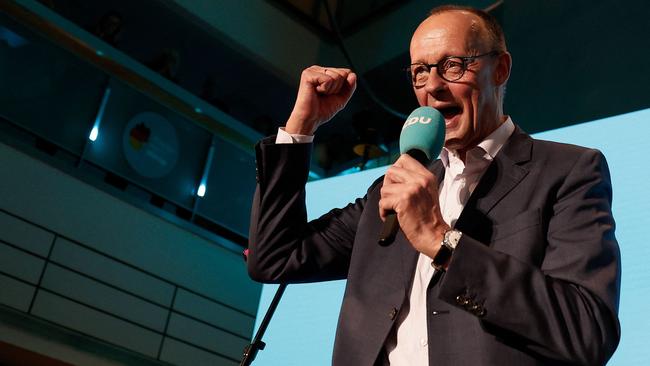Win for German conservatives, with far-right hot on their heels
The conservative Christian Democratic Union party has declared victory in the German elections, but exit polls show the hard-right in second place.

The conservative Christian Democratic Union party has declared victory in the German elections, but exit polls show the hard-right Alternative for Germany in second place after sweeping up millions of young and working-class voters.
Friedrich Merz, in pole position to become chancellor as leader of the CDU, said a difficult task lay ahead as he pledged to restore his country’s prestige in Europe and the wider world.
His priority would be to strengthen Europe so it could “achieve independence” from the US. “It is clear that the Americans … are largely indifferent to the fate of Europe,” he said. Mr Merz also criticised Elon Musk for his “outrageous” endorsements of the AfD, likening the remarks to election meddling from Russia.
After a brief and highly charged campaign, the CDU and its Bavarian allies the CSU were projected to come first with 28.6 per cent of the vote. The AfD was predicted to double its number of MPs to 149, with 20.4 per cent.
Alice Weidel, the AfD’s candidate for chancellor, hailed a “historic success” for her party and urged Mr Merz to tear down the “firewall”, a consensus among the main political parties since the end of World War II that the hard right must never be allowed in government again. She said Mr Merz would be an “interim” chancellor and predicted his government would fall apart.
The AfD was dominant not only in its traditional east German heartlands but also among working-class voters across the country, winning 37 per cent of their votes. It also performed strongly among the under-45s, coming first in the 25-to-34 age bracket.
The AfD has pledged “remigration” – the mass expulsion of immigrants – and said it could resurrect the economy by cutting taxes, raising state pension payments, reviving Germany’s nuclear reactors and bringing back pipeline gas imports from Russia. It also vowed to take Germany back to the Deutschmark, its old national currency, and reduce the EU to a more disparate “Europe of sovereign nations”.
However, Mr Merz reiterated his refusal to cut a deal with the AfD, insisting he could form a viable government with the centre-left, despite some of his own MPs expressing concern that the coalition could prove unstable.
“You can reach out to us as much as you want, we’re not going to pursue wrong policies for this country,” he told Ms Weidel. “I’m not going to call into question 75 years of the Federal Republic of Germany just because there is suddenly a so-called Alternative for Germany.”
The election was disastrous for the Chancellor, Olaf Scholz, and his Social Democratic party (SPD), which was expected to finish third on 16.3 per cent, its worst performance since World War II. It is likely to spell the end of Mr Scholz’s career in frontline politics.
Mr Merz’s hopes of building a cogent majority in alliance with the SPD were left dangling amid uncertainty about whether two smaller parties might squeak into the Bundestag and deny him the necessary seats. He may yet have to bring in a second partner, threatening further instability after three years of bickering tore Mr Scholz’s three-party government apart. The campaign was dominated by public dissatisfaction with a stagnant economy and the state’s inability to control its borders, after foreigners carried out terror attacks and mass stabbings in the cities of Solingen, Magdeburg, Aschaffenburg and Munich.
The election was also overshadowed by interventions from JD Vance, the US Vice-President, and Mr Musk, who gave vocal support to the AfD. However, US President Donald Trump called the victory “a great day for Germany, and for the United States”.
“Much like the USA, the people of Germany got tired of the no commonsense agenda, especially on energy and immigration, that has prevailed for so many years,” Mr Trump said.
Ukrainian President Volodymyr Zelensky also congratulated Mr Merz on his party’s win, saying he hoped to work with Germany to “strengthen Europe”.
“We look forward to continuing our joint work with Germany to protect lives, bring real peace closer to Ukraine, and strengthen Europe,” Mr Zelensky said. “Europe must be able to defend itself, develop its industries, and achieve the necessary results. Europe needs shared successes, and those success will bring even greater unity to Europe.”
Mr Merz argued during the election campaign that Europe needed to take more responsibility for its own defence.
French President Emmanuel Macron, after congratulating Mr Merz, stressed the need for unity.
“We are more determined than ever to achieve great things together for France and for Germany and to work for a strong and sovereign Europe,” he said.
The Times



To join the conversation, please log in. Don't have an account? Register
Join the conversation, you are commenting as Logout